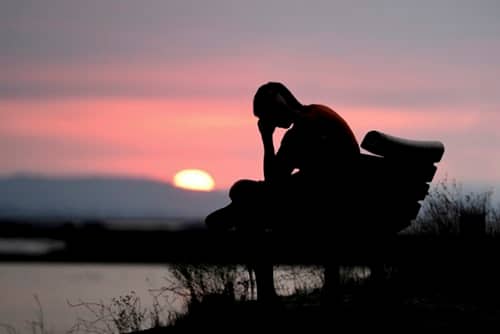Depression is a word that is often overused when people describe how they’re feeling. The problem in hijacking any word is that we can undermine the very real problems that people living with chronic depression face. People can say I’m depressed when they feel a bit down, when they feel out of sorts or when life isn’t going in the way that they hoped it would. But, if you have ever fallen down the black hole of depression then you will know it’s much more than a sound bite about a point in time in your life. It’s all-consuming and diminishes everything. Depression robs energy, it drains motivation, it severs hope and destroys appetite. It ambushes focus and forces you to a place of “what’s the point?” Questioning “why am I here?” or “why bother?”

Unlike anxiety, which can come out of the blue, depression usually builds over time and can take you unaware. By the time that you have begun to recognise it, and realised that something is wrong, you can find yourself in a very dark place.
Depression can run in families and if you have a had a couple of episodes of it in your life then the likelihood is that you will have more. It can be related to a chemical imbalance in the brain. If you feel like you are wading through treacle with the weight of the world on your back, then I’d recommend you first see your doctor. He or she might prescribe anti-depressants and although some people still hold stigma around them, they can be useful, especially in the short-term. Like a many of my clients, I have had times in my life when I have been prescribed them and used alongside other strategies, they have been like a rope ladder, providing the means to climb out of the black hole and back into the fresh air. In that fresher space I have found a way to bring in better coping strategies and found healthier ways to manage the depression.
Recognising and understanding depression, knowing that your symptoms may be like those of another person, but they may be different, is important. At the top of the rope ladder we can find support and build a plan to move forward. Good nutrition, good exercise, and good relationships can all be addressed in the plan because when working with depression we work holistically; inside and out.
Symptoms of depression may include:
- Persistent low mood
- Poor concentration
- Poor quality thinking – as if everything is tinged black and negative
- A sense of hopelessness
- Neglecting Self-care
- Relationships can suffer
- “I don’t feel like me anymore”
- Little or no enjoyment
- Everything feels like too much effort
- Spending much more time alone
- Random aches and pains for no diagnosed reason
- Poor quality sleep or sleeping too much
- Drinking, smoking, drug taking
Depression can also be difficult for the people close to you. It can impact the whole family because they can see probably much easier than you when you are stuck. They might not be able to put their finger on it or understand what’s going on, but they can see that you’re not ok. It might sound obvious but when we get consumed by depression, we can lose the ability to see what others are going through too; we can develop tunnel vision. If I’m honest we can seem a bit selfish and a bit self-indulgent at times especially if our friends and family don’t understand.
Depression can also have a foot in the past unlike anxiety which often involves worry about the future. (A point to make here though, is that you can be experiencing depression alongside anxiety or any of the other mental health conditions at the same time. It can become incredibly complex.) Research indicates that if you had difficult childhood experiences, also known as ACES (Adverse Childhood Experience), then as an adult, you are four and a half times more likely to develop depression than a peer whose childhood was ‘normal’. Living your formative years in a challenging home environment can set you on a course for depression. Looking back, I believe that I entered my teenage years with depression having grown up in a volatile home with two unhappy, alcoholic parents. It stands to reason that living in an unhealthy environment is likely to result in compromised mental health. Just as I was at risk physically, I was also at risk emotionally and mentally.
Depression can be missed, misdiagnosed and conversely, in my experience it can be diagnosed too readily but it is without a doubt, a distressing mental health condition.
How do we get started?
As with all health issues I believe that taking ownership is key. With careful management you can avoid debilitation and the downward spiral that often goes hand in hand with the condition.
In the therapy room we will create a holistic plan to move you forward. Therapeutic modalities that might help include ACT Therapy, EFT, and Clinical Hypnotherapy. Sometimes you just need somebody to hold the rope while you climb back up.

